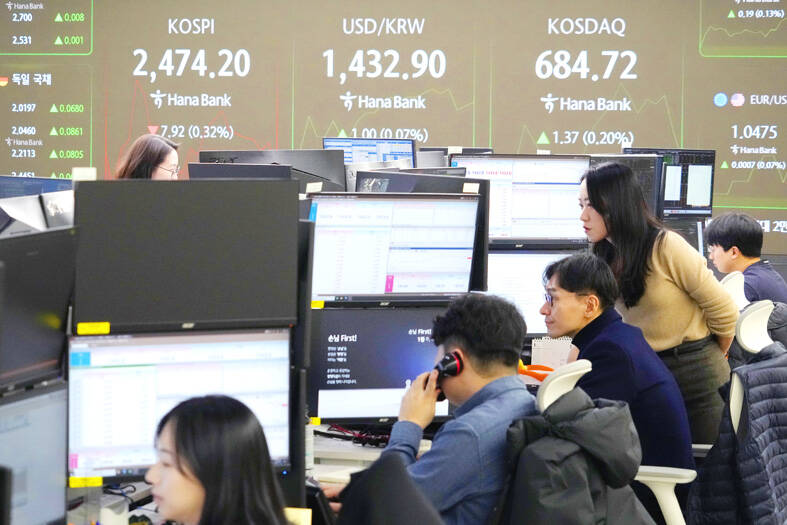South Korea’s central bank vowed to stabilize financial markets and highlighted the importance of “uninterrupted implementation” of key fiscal and economic measures, in its first statement since lawmakers voted to impeach South Korean President Yoon Suk-yeol.
“The Bank of Korea [BOK] intends to utilize all available policy instruments, in conjunction with the government, to respond to and avert an escalation of volatility in financial and foreign exchange markets,” the central bank said yesterday, addressing the fallout of Yoon’s failed martial law decree earlier this month.
Comparing the current situation with the impeachment phases of past presidents, the BOK said the latest case is “characterized by greater external challenges, such as heightened uncertainty in the trading environment and intensified global competition.”

Photo: AP
“Should these external factors overlap with domestic ones, their impact may amplify,” the BOK said, calling for an interventionist approach to righting the economy.
In the days after Yoon’s martial law declaration, the stock market plunged and the South Korean won at one point tumbled against the US dollar to the worst level since the global financial crisis erupted in 2008.
The central bank’s message comes after South Korea’s parliament on Saturday voted to oust Yoon from office, a decision that must now be reviewed by the Constitutional Court.
After the ballot, South Korean Prime Minister Han Duck-soo, who serves as acting president, asked his advisers to step up their monitoring of financial markets, calling for “swift and bold” stabilizing steps if needed.
“Predictability of the political process is expected to improve going forward and financial market volatility is anticipated to reduce” following the impeachment vote, the central bank said in its statement.
South Korea’s main opposition leader Lee Jae-myung also underscored the importance of restoring normality. Lee proposed creating a bipartisan body involving parliament and the executive branch to discuss ways to stabilize the state and boost a flagging domestic economy.
“What we need to discuss right now is slumping domestic demand and the slowdown in the economy due to the shrinking fiscal role of the government,” Lee said at a news conference yesterday. “In order to solve this problem, I think we need to discuss the supplementary budget swiftly.”
The Constitutional Court has 180 days to rule on the validity of the impeachment motion passed on Saturday. If the court moves forward with removing Yoon, presidential elections must be held within 60 days.

The US dollar was trading at NT$29.7 at 10am today on the Taipei Foreign Exchange, as the New Taiwan dollar gained NT$1.364 from the previous close last week. The NT dollar continued to rise today, after surging 3.07 percent on Friday. After opening at NT$30.91, the NT dollar gained more than NT$1 in just 15 minutes, briefly passing the NT$30 mark. Before the US Department of the Treasury's semi-annual currency report came out, expectations that the NT dollar would keep rising were already building. The NT dollar on Friday closed at NT$31.064, up by NT$0.953 — a 3.07 percent single-day gain. Today,

‘SHORT TERM’: The local currency would likely remain strong in the near term, driven by anticipated US trade pressure, capital inflows and expectations of a US Fed rate cut The US dollar is expected to fall below NT$30 in the near term, as traders anticipate increased pressure from Washington for Taiwan to allow the New Taiwan dollar to appreciate, Cathay United Bank (國泰世華銀行) chief economist Lin Chi-chao (林啟超) said. Following a sharp drop in the greenback against the NT dollar on Friday, Lin told the Central News Agency that the local currency is likely to remain strong in the short term, driven in part by market psychology surrounding anticipated US policy pressure. On Friday, the US dollar fell NT$0.953, or 3.07 percent, closing at NT$31.064 — its lowest level since Jan.

The New Taiwan dollar and Taiwanese stocks surged on signs that trade tensions between the world’s top two economies might start easing and as US tech earnings boosted the outlook of the nation’s semiconductor exports. The NT dollar strengthened as much as 3.8 percent versus the US dollar to 30.815, the biggest intraday gain since January 2011, closing at NT$31.064. The benchmark TAIEX jumped 2.73 percent to outperform the region’s equity gauges. Outlook for global trade improved after China said it is assessing possible trade talks with the US, providing a boost for the nation’s currency and shares. As the NT dollar

The Financial Supervisory Commission (FSC) yesterday met with some of the nation’s largest insurance companies as a skyrocketing New Taiwan dollar piles pressure on their hundreds of billions of dollars in US bond investments. The commission has asked some life insurance firms, among the biggest Asian holders of US debt, to discuss how the rapidly strengthening NT dollar has impacted their operations, people familiar with the matter said. The meeting took place as the NT dollar jumped as much as 5 percent yesterday, its biggest intraday gain in more than three decades. The local currency surged as exporters rushed to